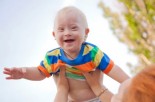Down Syndrome can be detected prenatally, which can help parents prepare for their special needs child.
Each person with Down Syndrome is unique, having some of the many possible health, learning, and related differences that can occur with this condition.
Some of the differences in people with Down Syndrome are common and visible, like facial appearance. Other changes are less common or less visible but can still cause problems or may need special treatments.
If you've just learned your child will be born with down syndrome, there is info available to help you get prepared.
Melanie Cole, MS, and Dr. Marilyn J. Bull discuss some of the health issues parents should be prepared for and how the outlook for children with Down Syndrome has changed.

 Dr. Marilyn Bull is a graduate of the University of Michigan Medical School and continued her education with a pediatric residency at Children's Memorial Hospital of Chicago and a clinical fellowship in Birth Defects and Genetic Counseling at Boston Floating Hospital. She has served on the faculty at the Indiana University Medical Center since 1976 where she currently is the Morris Green Professor of Pediatrics at Riley Hospital for Children at IU Health. Dr. Bull served as the director of the section of Developmental Pediatrics at Riley Hospital from 1982 until 2006. Her continuing administrative appointments include director of the Down Syndrome Program and the Feeding Team as well as co-medical director of the Automotive Safety Program. She has Board Certification in Pediatrics, Clinical Genetics and Neuro-developmental Disabilities. She is active in the American Academy of Pediatrics and currently serves on their Board of Directors. She was the lead author of the AAP Report: Health Supervision for Children with Down Syndrome.
Dr. Marilyn Bull is a graduate of the University of Michigan Medical School and continued her education with a pediatric residency at Children's Memorial Hospital of Chicago and a clinical fellowship in Birth Defects and Genetic Counseling at Boston Floating Hospital. She has served on the faculty at the Indiana University Medical Center since 1976 where she currently is the Morris Green Professor of Pediatrics at Riley Hospital for Children at IU Health. Dr. Bull served as the director of the section of Developmental Pediatrics at Riley Hospital from 1982 until 2006. Her continuing administrative appointments include director of the Down Syndrome Program and the Feeding Team as well as co-medical director of the Automotive Safety Program. She has Board Certification in Pediatrics, Clinical Genetics and Neuro-developmental Disabilities. She is active in the American Academy of Pediatrics and currently serves on their Board of Directors. She was the lead author of the AAP Report: Health Supervision for Children with Down Syndrome.